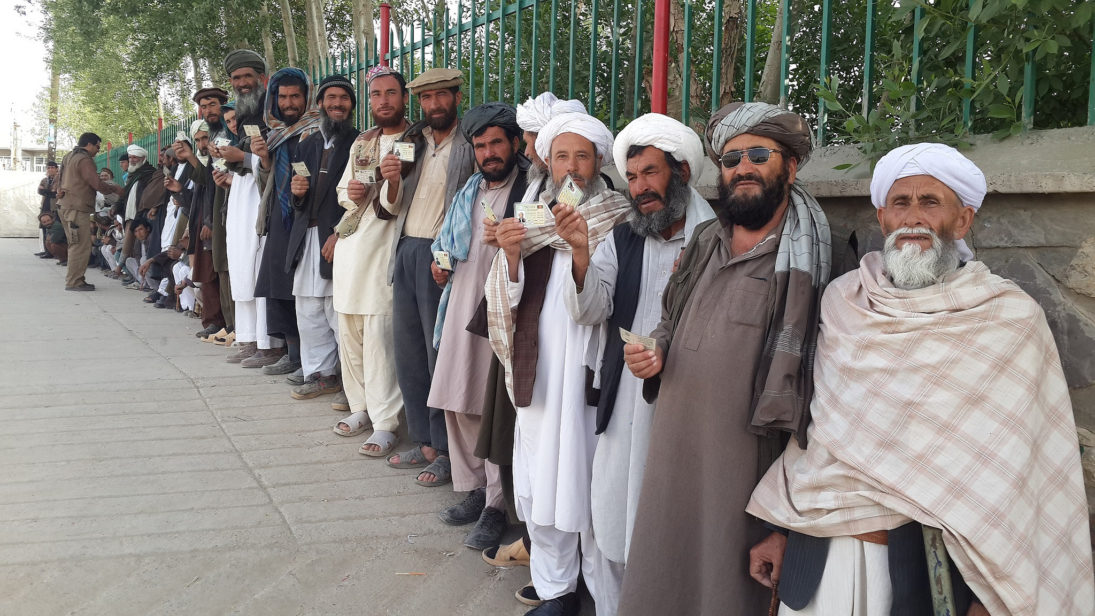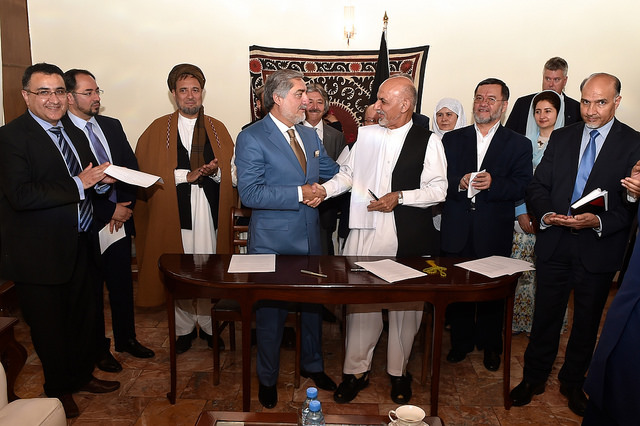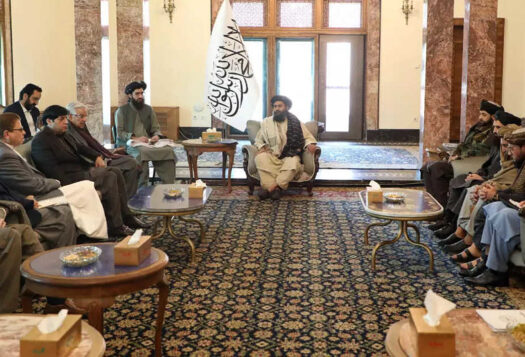
After three and a half years of delay, Afghanistan’s parliamentary and district council elections are finally scheduled to be held on October 20th, 2018. Though the Afghanistan parliament’s term was extended past June 2015 in order to promote fairness and transparency in the electoral system, no major reforms have been carried out except for polling center assessments, the new elections law, and the establishment of voter registration database, all of which have been plagued by controversies. Still, the government remains determined to hold the elections. President Ashraf Ghani issued a decree to instruct all government employees to register for elections along with their family members. The National Unity Government (NUG) has also continued calling on the people to register to vote, dropping leaflets, and asking the public, civil society, and political parties to endorse the Independent Elections Commission (IEC).
Despite the apparent determination of the government, just over one million of around 14 million eligible voters have registered to vote. A lack of public enthusiasm, the failure of major electoral reforms, and widespread security threats have prompted these meager numbers, threatening low voter turnout in the October elections. Parliamentary and district council elections marred by fraud or low turnout will have dire implications for Afghan democracy and the forthcoming 2019 presidential elections.
Delayed and Insufficient Electoral Reforms
New Election Law
Pervasive fraud during the 2014 presidential elections dragged the country on the brink of a civil war, culminating into a year-long crisis that was finally resolved following intervention by the United States. The elections crisis was so severe that the two contestants, Ashraf Ghani and Abdullah Abdullah, agreed to share power in the NUG, with Ghani serving as president and Abdullah filling the newly-formed role of chief executive officer. Upon formation, the NUG committed itself to rigorous electoral reforms intended to restore the people’s faith in the electoral system and ensure transparency in future elections.
Parliamentary and district council elections marred by fraud or low turnout will have dire implications for Afghan democracy and the forthcoming 2019 presidential elections.
As a result, an Electoral Reforms Commission was set up by a presidential decree issued on March 2015. The commission was immediately tasked with reviewing the electoral system, electoral laws, and electoral bodies and providing its recommendations. After the commission presented two packages of recommendations in August and December 2015, the president issued two decrees to instruct the parliament to amend elections laws, but both decrees were rejected by both houses of the assembly. As a result, the government prepared the new Election Law without any significant changes or reforms, passing it by a legislative decree in September 2016 without sending it to the parliament for approval, citing article 109 of the constitution, which bars the parliament from amending the electoral law during the last year of its term. The fact that the new electoral law has been approved by the cabinet, but not the parliament, has shrouded the process in legal ambiguity.
Thus, with little having changed from the 2014 elections, the electoral system itself remains a polarizing and controversial issue in Afghan politics. On February 24th, 2018, representatives and officials of 21 political parties and groups held a conference in Kabul that culminated into a joint statement calling for a change of the electoral system in order to allow more space for political parties in the elections. This has been deemed a powerful opposition to the current electoral system, and by corollary to the new electoral law, because of the fact that major political parties like Jamiat-i-Islami (Tajiks), Hizb-i-Islami (Pashtuns), Junbesh-i-Milli (Uzbeks), and two Hizb-i-Wahdat (Hazaras) are in the coalition. Such contention over the structure of the electoral system does not bode well for the parliamentary elections or next year’s presidential elections.

Assessment of Voting Centers
In a step towards fair elections, the IEC has assessed all voting centers across the country in an attempt to ensure their accessibility and to minimize chances of fraud in the upcoming elections. Although this is a necessary measure, the IEC’s assessments have been attacked by skeptics as insufficient due to the fact that assessments have not been conducted in 33 districts due to insecurity. It has also been revealed that some areas in which the IEC claims to have conducted the assessment have not been assessed at all. Finally, concerns over location of voting centers in less accessible areas, such as houses of strongmen and Taliban commanders, also prevail, as ballots being sent to areas unable to be monitored are likely to be sent back fraudulently. These concerns undermine the people’s trust in the electoral reforms and the electoral system, as reflected in the paltry voter registration numbers for the district council and parliamentary elections.
Creation of a Voter Registry and Electronic IDs
According to the 2014 NUG agreement, the government was to distribute electronic IDs to the citizens to prevent voter fraud in future elections. However, the roll out of this system has been thwarted by a bitter political debate over the nomenclature of “Afghan” in the electronic IDs. Instead, the IEC proceeded to prepare the voter registry using the old paper IDs, which are problematic since many citizens hold more than one. These manual IDs, which were used in past elections, are another example of how the NUG has failed to rectify the issues that beset the 2014 elections. Elections monitoring groups have also accused the IEC of mismanagement due to the release of a computerized voter registration database two weeks after the launch of voter registration. Although a voter registration list is crucial for transparency in future elections, these controversies have cast a disheartening shadow over the existence of such a registry.
Security Threats: The Most Pressing Challenge
Insecurity remains the most pressing challenge ahead of the voter registration process. According to the latest report of the Special Inspector General of Afghan Reconstruction (SIGAR) released on April 28, Afghanistan experiences 55.9 security incidents per day. The security situation in the country will have a direct impact on voter safety at polling centers: the deputy minister of Afghanistan’s Ministry of Interior has said that 43 percent of polling centers are located in areas experiencing medium to high security threats. The overall security situation will impact access to polling centers throughout the registration process and on polling centers: 47 centers in Badakhshan province, along with more than 70 centers across the country, remain closed.
The deputy minister of Afghanistan’s Ministry of Interior has said that 43 percent of polling centers are located in areas experiencing medium to high security threats.
Threats and attacks by the Taliban and the Islamic State-Khorasan Province (ISKP), both of whom oppose mainstream politics and the elections process, have also hampered voter registration and will likely impact turnout on elections day. Indeed, the Taliban have reportedly been threatening villagers that their homes will be targeted if they vote. Moreover, the recent attack on a voting registration center in Kabul that killed over 60 and wounded over 100 civilians, for which ISKP claimed responsibility, is a sign that even venturing to register to vote may be too dangerous. Other voter registration centers have been directly attacked in Khost, Nangarhar, Badghis, Ghor, and Baghlan provinces. These dire circumstances have badly damaged the voter registration process and threaten to impact whether the parliamentary elections will even be held.
Prospects for October Elections
Given the dire security situation and low turnout for voter registration, one cannot rule out the cancellation of elections this fall. If the October elections are held, insecurity, deficient electoral reforms, and a lack of public trust and interest in the electoral process threaten to provoke fraud and low voter turnout. If such a scenario comes true, it will be a major impediment for the Afghan democracy with irreparable ramifications for the 2019 presidential elections.
***
Click here to read this article in Urdu.
Image 1: USAID Afghanistan via Flickr
Image 2: U.S. Department of State via Flickr


